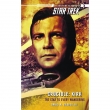
Текст книги "Cress"
Автор книги: Marissa Meyer
Жанр:
Детская фантастика
сообщить о нарушении
Текущая страница: 7 (всего у книги 27 страниц)
“I saw her first!” a girl squealed. She ran out from the crowd, her flip-flops smacking the dirt, and grasped Cinder’s arm. Startled, Cinder tried to pull away, but the girl held firm.
Then there were two boys, not older than nine or ten, emerging from the crowd and arguing over who had seen the ship drop out of the sky, who had seen it land, who had seen the docks open, and who had first spotted the cyborg.
“Step away from Miss Linh, you greedy little vultures.”
Cinder whirled around.
Dr. Erland was striding toward them, though she almost didn’t recognize him. Barefoot and hatless, he wore a pair of khaki shorts and a striped shirt that hung lopsided, as he’d missed a buttonhole and the rest of the buttons were all wrong. His gray hair stuck out along his bald spot like he’d recently been electrocuted.
None of that mattered. She’d found him.
“I suppose you can all share the prize for finding her, even though the deal was to bring her to me, not make me come all the way down here in this center-of-the-sun heat.” He pulled a bag of gummy candies from his pocket and held it up over the children’s heads, forcing them to promise to share before he handed it over. They snatched it and ran away squealing.
The rest of the townspeople remained where they were.
Dr. Erland planted his hands on his hips and glared up at Cinder. “You have much explaining to do. Do you know how long I’ve been waiting for you, watching the—”
“I need your help!” she said, stumbling toward him. “My friend … he’s dying … he needs a doctor … I don’t know what to do.”
He scowled, then his attention caught on something over Cinder’s shoulder. The Lunar guard emerged at the edge of the ship, shirtless and covered in blood and straining to support Wolf’s body.
“What—he’s—”
“A Lunar guard,” said Cinder. “And Wolf is one of her soldiers. It’s a long story, and I’ll explain later, but can you help him? He was shot twice, he’s lost a lot of blood.…”
Dr. Erland raised an eyebrow. Cinder could tell he wasn’t at all thrilled with the company she was keeping.
“Please.”
Harrumphing, he gestured at some of the onlookers and called out a few names. Three men stepped forward. “Bring him to the hotel,” he said. “Gently.” With a sigh, he set about redoing the buttons on his shirt. “Follow me, Miss Linh. You can help prepare the tools.”
Fifteen
“I suppose it’s too much to hope that we landed ourselves near any sort of civilization,” Thorne said, tilting his head to one side.
Cress picked her way through the debris to the nearest window. “I’m not sure we want to be near civilization. You’re a wanted criminal in three Earthen countries, and one of the most recognizable men on Earth.”
“I am pretty famous now, aren’t I?” Grinning, he waved a hand at her. “I guess it doesn’t matter what we want. What do you see out there?”
Standing on tiptoes, Cress peered into the brightness. As her eyes adjusted to the glare, they widened, trying to take it all in.
All at once, it dawned on her. She was on Earth. On Earth.
She’d seen pictures, of course. Thousands and thousands of photographs and vids—cities and lakes and forests and mountains, every landscape imaginable. But she had never thought the sky could be so impossibly blue, or that the land could hold so many hues of gold, or could glitter like a sea of diamonds, or could roll and swell like a breathing creature.
For one moment, the reality of it all poured into her body and overflowed.
“Cress?”
“It’s beautiful out there.”
A hesitation, before, “Could you be more specific?”
“The sky is this gorgeous, intense blue color.” She pressed her fingers to the glass and traced the wavy hills on the horizon.
“Oh, good. You’ve really narrowed it down for me.”
“I’m sorry, it’s just…” She tried to stamp down the rush of emotion. “I think we’re in a desert.”
“Cactuses and tumbleweeds?”
“No. Just a lot of sand. It’s kind of orangish-gold, with hints of pink, and I can see tiny clouds of it floating above the ground, like … like smoke.”
“Piled up in lots of hills?”
“Yes, exactly! And it’s beautiful.”
Thorne snorted. “If this is how you feel about a desert, I can’t wait until you see your first real tree. Your mind will explode.”
She beamed out at the world. Trees.
“That explains the heat then,” Thorne said. Cress, in her thin cotton dress, hadn’t noticed before, but the temperature did seem to be rising. The controls must have been reset in the fall, or perhaps destroyed altogether. “A desert would not have been my first choice. Do you see anything useful? Palm trees? Watering holes? A pair of camels out for a stroll?”
She looked again, noting how a pattern of ripples had been carved into the landscape, repeating for eternity. “No. There’s nothing else.”
“All right, here’s what I need you to do.” Thorne ticked off on his fingers. “First, find some way to contact the Rampion. The sooner we can get back on my ship, the better. Second, let’s see if we can get that door open. We’re going to be baked alive if the temperature keeps rising like this.”
Cress studied the mess of screens and cords on the floor. “The satellite was never installed with external communication abilities. The only chance we had of contacting your crew was the D-COMM chip that Sybil took. And even if we did have some way of contacting them, we won’t be able to give exact coordinates unless the satellite positioning system is functioning, and even then—”
Thorne held up a hand. “One thing at a time. We have to let them know that we’re not dead, and check that they’re all right too. I think they’re capable of handling two measly Lunars, but it would put my mind at ease to be sure.” He shrugged. “Once they know to start looking for us, maybe Cinder can whip up a giant metal detector or something.”
Cress scanned the wreckage. “I’m not sure anything is salvageable. The screens are all destroyed, and judging from the loss of temperature regulation, the generator is—oh, no. Little Cress!” She wailed and kicked her way to the main databoard that had housed her younger self. It was crushed on one side, bits of wire and plastic dangling from the shell. “Oh, Little Cress…”
“Um, who’s Little Cress?”
She sniffed. “Me. When I was ten. She lived in the computer and kept me company and now she’s dead.” She squeezed the databoard against her chest. “Poor, sweet Little Cress.”
After a long silence, Thorne cleared his throat. “Scarlet did warn me about this. Do we need to bury Little Cress before we can move on? Want me to say a few words for her?”
Cress glanced up, and though his expression was sympathetic, she thought he was probably mocking her. “I’m not crazy. I know she’s just a computer. It’s just … I programmed her myself, and she was the only friend I had. That’s all.”
“Hey, I’m not judging. I’m familiar with IT-relations. Just wait until you meet our spaceship. She’s a riot.” His expression became thoughtful. “Speaking of spaceships, what about that other pod, the one the guard docked with?”
“Oh, I’d forgotten about that!” She tucked the databoard beneath its slanted desk and tripped over to the other entryway. The satellite sat at an angle, with the second entry near the lower end of the slope, and she had to clear away countless bits of plastic and broken equipment before she could get to the control screen. The screen itself was down—she couldn’t get a flicker of power out of it—so she opened the panel that housed the manual override locks instead. A series of gears and handles had been set into the wall over the door, and while Cress had known they were there for years, she’d never given them much thought before.
The devices were stuck from years of neglect and it took all her strength to pull on the handle, planting one foot on the wall to gain leverage. Finally it snapped down and the doors sprang open, leaving a gap.
Hearing her struggle, Thorne got up and trudged toward her, carefully kicking debris out of his way. He kept his hands outstretched until he bumped into her and together they pried open the door.
The docking hatch was in worse shape than the satellite. Almost an entire wall had been sheared off and piles of sand had already begun to blow in between the cracks. Wires and clamps dangled from the shattered wall panels and Cress could smell smoke and the bitter scent of burned plastic. The podship had been shoved up into the corridor, crumpling the far end of the hatch like an accordion. The docking clamp had been rammed straight through the ship’s cockpit control panel, filling the glass with hairline fractures.
“Please tell me it looks better than it smells,” said Thorne, hanging on to the door frame.
“Not really. The ship is destroyed, and it looks like all the instruments too.” Cress climbed down, holding on to the wall for balance. She tried pressing some buttons to bring the ship back to life, but it was useless.
“All right. Next plan.” Thorne rubbed his eyes. “We have no way of contacting the Rampion and they have no way of knowing we’re alive. Probably won’t do us much good to stay here and hope someone passes by. We’re going to have to try and find some sort of civilization.”
She wrapped her arms around herself, a mix of nerves and giddiness swirling in her stomach. She was going to leave the satellite.
“It looked like the sun was setting,” she said. “So at least we won’t be walking in the heat.”
Thorne screwed up his lips in thought. “This time of year the nights shouldn’t be too cold, no matter which hemisphere we’ve landed in. We need to gather up all the supplies we can carry. Do you have any more blankets? And you’ll want a jacket.”
Cress rubbed her palms down the thin dress. “I don’t have a jacket. I’ve never needed one.”
Thorne sighed. “Figures.”
“I do have another dress that isn’t quite so worn as this one.”
“Pants would be better.”
She glanced down at her bare legs. She’d never worn pants before. “These dresses are all Sybil brought me. I … I don’t have any shoes, either.”
“No shoes?” Thorne massaged his brow. “All right, fine. I went through survival training in the military. I can figure this out.”
“I do have a few bottles we can fill with water. And plenty of food packs.”
“It’s a start. Water is our first priority. Dehydration will be a much bigger threat than hunger. Do you have any towels?”
“A couple.”
“Good. Bring those, and something we can use for rope.” He raised his left foot. “While you’re at it, do you have any idea where my other boot ended up?”
* * *
“Are you sure you don’t want me to do that?”
Thorne scowled, his empty gaze pinned somewhere around her knee. “I may be temporarily blind, but I’m not useless. I can still tie good knots.”
Cress scratched at her ear and withheld further comment. She was seated on the edge of her bed, braiding a discarded lock of her own hair to use for rope, while Thorne knelt before her. His face was set in concentration as he wrapped a towel around her foot, then looped the “rope” around her ankle and the arch of her foot a few times before securing it with an elaborate knot.
“We want them to be nice and tight. If the fabric is too loose it will rub and give you blisters. How does that feel?”
She wiggled her toes. “Good,” she said, and waited until Thorne had finished the other foot before surreptitiously adjusting the folds of the cloth to be more comfortable. When she stood, it felt strange—like walking on lumpy pillows—but Thorne seemed to think she’d be grateful for the makeshift shoes when they were out in the desert.
Together, they fashioned a bundle out of a blanket, which they filled with water, food, bedsheets, and a small medical kit that Cress had rarely needed. The knife was safely in Thorne’s boot and they’d disassembled part of the busted bed frame for Thorne to use as a walking cane. They each drank as much water as they could stand and then, as Cress gave one last inspection of the satellite and could think of nothing else worth taking, she stepped to the docking hatch and pulled down the manual unlock lever. With a kathunk, the door’s internal devices released. The hydraulics hissed. A crack opened between the metal doors, allowing Thorne to get his fingers in and push one side into its wall pocket.
A breeze of dry air blew into the satellite—a scent Cress had no comparison for. It was nothing like the satellite or the machinery or Sybil’s perfume.
Earth, she supposed, memorizing the aroma. Or desert.
Thorne swung the makeshift supply bundle over his shoulder. Kicking some debris out of the way, he reached his hand toward Cress.
“Lead the way.”
His hand encased hers and she wanted to savor the moment, the sensation of touch and warmth and this perfect smell of freedom, but Thorne was nudging her forward before the moment had settled.
At the end of the docking hatch was the rail and two steps leading down to where a podship normally attached, but now there was only sand, tinted lavender as night’s shadows crept forward. It had already started to blow up onto the second step and Cress had a vision of the satellite being slowly buried beneath it, disappearing forever in the desert.
And then she looked out, past the railing and the dunes, toward the rolling horizon. The sky was a haze of violet, and where that faded away—blue and black and stars. The same stars she’d known all her life, and yet now they were spread out like a blanket over her. Now there was an entire sky and an entire world ready to engulf her.
Her head swam. Suddenly dizzy, Cress stumbled backward, crashing into Thorne.
“What? What is it?”
She tried to swallow down the rising panic, this sensation that her existence was as small and unimportant as the tiniest fleck of sand blowing against her shins. There was a whole world—a whole planet. And she was stuck somewhere in the middle of it, away from everything. There were no walls, no boundaries, nothing to hide behind. A shudder swept over her, goose bumps crawling across her bare arms.
“Cress. What happened? What do you see?” Thorne’s fingers tightened on her arms, and she realized she was trembling.
She stammered twice before forcing the thought out of her head. “It—it’s so big.”
“What’s so big?”
“Everything. Earth. The sky. It didn’t seem so big from space.”
Her pulse was a drum, thundering through every artery. She could hardly take in any air, and she had to cover her face and turn away before she could breathe again. Even then the sensation was painful.
Suddenly she was crying, without knowing when the tears had started.
Thorne’s hands found her elbows, tender and gentle. There was a moment in which she expected to be taken into his arms, pressed warm and safe against his chest. She yearned for it.
But instead, he shook her—hard.
“Stop it!”
Cress hiccupped.
“What is the number one thing people die from in the desert?”
She blinked, and another hot tear slipped down her cheek. “Wh-what?”
“The number one cause of deaths. What is it?”
“De-dehydration?” she said, recalling the Survival 101 lecture he’d given while filling up their water bottles.
“And what does crying do?”
It took a moment. “Dehydrates?”
“Exactly.” His grip relaxed. “It’s all right to be scared. I get that until now most of your existence has been contained in two hundred square meters. In fact, so far you’ve shown yourself to be saner than I expected.”
She sniffed, unsure if he’d just complimented or insulted her.
“But I need you to pull yourself together. You may have noticed that I’m not exactly in prime form right now, and I am relying on you to be aware and observant and help us find our way out of this, because if we don’t … I don’t know about you, but I’m just not fond of the idea of being stranded out here and eaten alive by vultures. So, can I depend on you to hold it together? For both of us?”
“Yes,” she whispered, though her chest was about to burst with all the doubts being crammed into it.
Thorne squinted and she didn’t think he believed her.
“I’m not convinced that you fully grasp the situation here, Cress. We will be eaten. Alive. By vultures. Can you visualize that for a second?”
“Y-yes. Vultures. I understand.”
“Good. Because I need you. And those are not words that I throw around every day. Now, are you going to be all right?”
“Yes. Just give me—I just need a moment.”
This time, she took in an extra deep breath and shut her eyes and grappled for a daydream, any daydream …
“I am an explorer,” she whispered, “setting courageously off into the wild unknown.” It was not a daydream she’d ever had before, but she felt the familiar comfort of her imagination wrapping around her. She was an archaeologist, a scientist, a treasure hunter. She was a master of land and sea. “My life is an adventure,” she said, growing confident as she opened her eyes again. “I will not be shackled to this satellite anymore.”
Thorne tilted his head to one side. He waited for three heartbeats before sliding one hand down into hers. “I have no idea what you’re talking about,” he said. “But we’ll go with it.”
Sixteen
Thorne passed the makeshift cane to his opposite side so he could hold Cress’s elbow as they stepped out onto the sand. She kept her head down, carefully choosing each step but also afraid that if she looked up into the sky, her legs would freeze beneath her and she would never be able to make them move again.
When they’d gone a safe distance from the satellite, Cress tentatively lifted her gaze. Ahead of her was the same eternal landscape, the sky growing darker.
She glanced back toward the satellite, and gasped.
Thorne’s hand squeezed her elbow.
“There are mountains,” she said, gaping at the jagged peaks along the horizon.
He squinted. “Mountains, or glorified hills?”
She considered the question, comparing the site before her with the photos of mountain ranges she’d seen on the screens. Dozens of peaks of varying heights disappeared into the blackness of night.
“I think … real mountains,” she said. “But it’s getting dark, and I can’t see any white on top. Do mountains always have snow?”
“Not always. How far are they?”
“Um…” They seemed close, but the foothills and sand dunes between them could have been deceiving, and she’d never been asked to judge distances before.
“Never mind.” Thorne tapped the cane against the ground. It stirred something in Cress’s gut when he didn’t let go of her arm, though perhaps he appreciated the tethering sensation as much as she did. “What direction are they in?”
She took his hand and pointed. Her heart was fluttering erratically and she felt herself trapped between elation and terror. Even from this distance, she could tell that the mountains were enormous—hulking, ancient beasts lined up like an impenetrable wall dividing this wasteland. But at least they were something, a physical, visual marker to break up the monotony of the desert. They somehow calmed her, even while making her feel as insignificant as ever.
“So that must be … south, right?” He pointed in another direction. “The sun set over there?”
She followed his gesture, where a faint green light could still be seen over the rolling dunes, fading fast. “Yes,” she said, a shaky smile stretching across her lips. Her first true sunset. She’d never known sunsets could be green, had never known just how quickly the darkness set in. Her thoughts hummed as she tried to pull together every minute detail, to store this moment safely away in a place where she would never, ever forget. Not the way the light turned dull and hazy above the desert. Not the way the stars emerged from the black. Not the way her instincts kept her gaze from wandering too far up into the sky, keeping her panic at bay.
“Do you see any plant life? Anything other than sand and mountains?”
“Not from here. But I can hardly see anything…” Even as they spoke, the blackness was taking over, the once-golden sand turning into shadows beneath her feet. “There’s our parachute,” she added, noting the deflated white fabric that stretched out over a sand dune. It was already being swallowed up by the shifting sands. A trench had been carved into the dune where the satellite had hit and slid down.
“We should cut off a piece,” said Thorne. “It could come in handy, especially if it’s waterproof.”
They said little as Cress guided him up the dune, the journey made difficult by the unstable ground. Thorne was awkward with the cane, trying to test the ground ahead of him without digging the tip into the hillside and stabbing himself with the other end. Finally they reached the parachute and managed to cut off a square large enough to be used as a tarp.
“Let’s head toward the mountains,” said Thorne. “It will keep us from walking directly into the sun in the morning, and with any luck they’ll offer some shelter, and maybe even water.”
Cress thought it sounded like as good a plan as any, but for the first time she noted a tinge of uncertainty in Thorne’s tone. He was just guessing. He didn’t know where they were or what direction would lead them to civilization. Every step they took could be leading them farther and farther from safety.
But a decision had to be made.
Together, they started up the next dune. The day’s heat was fading, and a mild breeze kicked sand at her shins. When they reached the top, she found herself staring into an ocean of nothingness. Night had arrived and she couldn’t even make out the mountains anymore. But as the stars grew brighter and her eyes adjusted, Cress realized that the world around her was not pitch-black but tinged with a faint silver hue.
Thorne tripped, yelping as he stumbled and collapsed onto his hands and knees. The makeshift cane was left jutting up from the sand, having narrowly missed impaling Thorne when he fell.
Gasping, Cress dropped to her knees beside him and pressed one hand against his back. “Are you all right?”
Roughly shaking her off, Thorne pushed himself back to sit on his heels. In the dim light, Cress could see that his jaw was clenched tight, his hands balled into fists.
“Captain?”
“I’m fine,” he said, an edge to his tone.
Cress hesitated, her fingers hovering over his shoulder.
She watched as his chest expanded with a slow breath, and listened to the shaky, strained exhale.
“I,” he began, speaking slowly, “am not happy with this turn of events.”
Cress bit her lip, burning with sympathy. “What can I do?”
After a moment of glaring absently toward the mountains, Thorne shook his head. “Nothing,” he said, reaching back until his arm hit the cane. He wrapped his fingers around it. “I can do this. I just need to figure it out.”
He climbed to his feet and yanked the traitorous cane out of the sand. “Actually, if you could try to give me some warning when we’re coming up on a hill, or about to start heading down again, that would help.”
“Of course. We’re almost to the top of…” She trailed off as her eyes left Thorne’s face to seek out the top of the dune and caught on the moon, a crescent glowing vivid and white off the horizon. She shriveled away from it, habit telling her to hide beneath her desk or bed until the moon couldn’t find her anymore—but there was no desk or bed to crawl beneath. And as the initial surprise wore off, she began to realize that the sight of the moon didn’t grip her with terror as it once had. From Earth, it somehow seemed so very far away. She gulped. “… almost to the top of this dune.”
Thorne quirked his head to the side. “What’s wrong?”
“Nothing. I just … I can see Luna. That’s all.”
She let her gaze wander away from the moon, taking in the night sky. She was tentative at first, worried that looking at the sky would once again overwhelm her, but she soon discovered that there was something comforting about seeing the same galaxy she’d always known. The same stars she’d been looking at all her life, seen through a new lens.
The tension in her body released, bit by bit. This was familiar. This was safe. The faint swirl of gasses in the universe, glowing purple and blue. The sparkle of thousands and thousands of stars, as numerous as sand grains, as breathtaking as an Earthen sunrise seen through her satellite window.
Her pulse skipped. “Wait—the constellations,” she said, spinning in a circle while Thorne brushed the sand from his knees.
“What?”
“There—there’s Pegasus, and Pisces, and—oh! It’s Andro-meda!”
“What are you … oh.” Thorne dug the cane into the sand, settling his weight against it. “For navigation.” He rubbed his jaw. “Those are all Northern Hemisphere constellations. That rules out Australia, at least.”
“Wait. Give me a minute. I can figure this out.” Cress pressed her fingers against the sides of her face, trying to picture herself looking at these same constellations, how many countless times from the windows of her satellite. She focused on Andromeda, the largest in sight, with its alpha star glowing like a beacon not far off the horizon. Where would her satellite have been in relation to Earth when she was seeing that star, at that angle?
After a moment, the constellations began to spread out like a holograph in her mind. As if she were seeing the shimmering illusion of Earth rotating slowly before her, surrounded by spaceships and satellites and stars, stars, stars …
“I think we’re in northern Africa,” she said, turning around to scan the other constellations that were emerging from the ocean of stars. “Or possibly the Commonwealth, in one of the western provinces.”
Thorne’s brow knit together. “Could be the Sahara.” His shoulders began to slump and Cress saw the moment when he realized that it made no difference what hemisphere they were in, what country. It was still a desert. They were still trapped. “We can’t stand here stargazing all night,” he said, bending down to pick up the bag of supplies and resituate it on his shoulder. “Let’s keep heading toward those mountains.”
Cress tried to offer him her elbow again, but Thorne only gave it a gentle squeeze before letting go. “Throws off my balance,” he said, testing the length of the cane so he could walk without spearing it into the ground again. “I’ll be fine.”
Burying her disappointment, Cress started up the dune. She announced the top when they reached it, and continued down the other side.
Seventeen
Scarlet was piloting the podship. She could not recall how long she had been flying it, or where she had been before, or how she had ended up behind these controls. But she knew very well why she was there.
Because she wanted to be.
Because she needed to be.
If she did well, she would be rewarded. The thought made her feel joyful. Eager. Willing.
And so she flew fast. She flew steady. She allowed the little ship to become an extension of her. Her hands gripping the controls, her fingers dancing over the instruments. She had never flown so well, not since the day her grandmother had begun teaching her in the delivery ship around the farm. How the ship had warbled under her unskilled hands. How it rocked and sank, its landing gear brushing against the just-tilled dirt, then miraculously drifted back up toward the sky as her grandmother’s patient voice talked her through the steps …
The memory disappeared as fast as it had come, snapping her back into the podship, and she could not remember what she had just been thinking. She could only think of this flight. This moment. This responsibility.
She paid no heed to the stars blurring out in all directions. She gave no thought to the planet falling farther and farther behind her.
In the ship’s backseat, the woman was hissing and cursing as she tended to her wound. She was upset, and this alone bothered Scarlet, because she wanted the woman to be pleased.
Eventually, the angry muttering died down and then the woman was talking. Scarlet’s heart fluttered, until she realized that it was not to her that the woman was speaking. Rather, she had sent out a comm. She heard two words that sent a bolt of panic through her—Your Majesty.
She was talking to the queen herself.
It occurred to Scarlet that this knowledge should terrify her, but she couldn’t recall why. Rather, she felt embarrassed to be listening in. It wasn’t her place to be curious. She tried to ignore the conversation, allowing her mind to muddle and wander. Inside her head, she recited childhood rhymes that she hadn’t thought of in years.
It mostly worked. Only when a name broached her consciousness did curiosity overcome her.
Linh Cinder.
“No, I could not capture her. I was overpowered. I am sorry, Your Majesty. I have failed you. Yes, I have already sent the last-known coordinates of the ship to the royal guard. I was able to capture a hostage, Your Majesty. One of her accomplices. Perhaps she has information on where Linh Cinder might go next, or what her plan could be. I know it isn’t good enough, Your Majesty. I will make this up to you, Your Majesty. I will find her.”
The conversation ended and Scarlet’s ears burned at having eavesdropped. She was ashamed. She deserved punishment.
In an attempt to make up for her delinquency, she refocused on her task. Flying as smooth and fast as any pilot had ever flown. She thought only of how she must fly well. She thought only of how she must make her mistress proud of her.
She felt no awe as she approached the great, crater-filled Luna with its gleaming white surface and sparkling domed cities.
Cities that were home to countless strangers.
Cities that had been his home, once …
She flinched at the intrusive thought. She did not know what it meant. She could not remember who he was.
But this was where he came from …
She suppressed the voice out of nervous panic that her mistress would sense her confusion. She did not want that. There was no confusion.
She knew precisely where she wanted to be. Precisely who she wished to be serving.
Scarlet felt no fear as the moon dwarfed the tiny ship, expanded until it was all she could see through the glass.
She paid no attention to the hot tears as they crept down her cheeks and dripped soundlessly into her lap.
Eighteen
It didn’t take long for Cress and Thorne to fall into a pattern. As Thorne became more comfortable with the movement of the sand underneath them and the sensation of the cane in his hand, he grew more confident, and their pace increased. Three dunes. Five. Ten. Before long, Cress realized that it took a lot less energy to stay in the valleys between the dunes when they could, so she began cutting a slower, yet less exhausting zigzag route across the desert.








